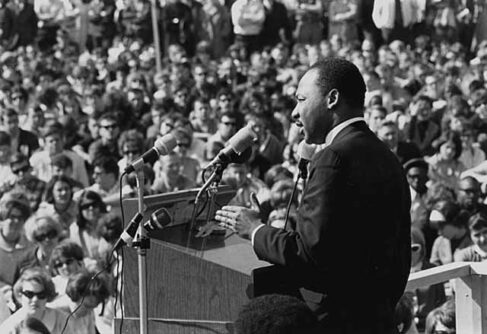The decline of marriage affects how American civil society holds up.
The old song goes, “Love and marriage go together like a horse and carriage.”
Well, nowadays, it’s no longer the case that love and marriage go together. This Valentine’s Day, fewer Americans than at any point in the last century will be celebrating the day with a spouse: according to a recent Pew Research Center study, barely half (50.5 percent) of adults are married.
That marks a half-century of decline in the share of adults who are married, from a peak of 72.2 percent in 1960.
The decline of marriage has, of course, many consequences for American society. Some of those consequences are suggested by the “horse and carriage” simile. Possessing a carriage—as opposed to a mere buggy—indicates a certain degree of prosperity. A “carriage” typically was a rather fancy four-wheeled vehicle, while a buggy typically was a more humble two-wheeled vehicle.
Love and marriage go together like a horse and carriage not only because they naturally complement each other, but because marriage tends to be accompanied by increased wealth and financial stability. Those who are married are more likely to be able to afford whatever is today’s equivalent of a fancy carriage than their unmarried peers.
As Brookings Institution senior fellow Ron Haskins observed in a New York Times story on the Pew study:
There are relatively few relationships that are more fully documented than those between economic well-being and marriage.
Contemporary social scientists have yet to explore fully the relationship between the health of civil society and marriage. Yet, that great “social scientist” of the nineteenth century, Alexis de Tocqueville, closely studied civil society as well as the mores around American marriages.
After Tocqueville describes Americans for their active civic life and multiplicity of civil associations, he praises how American marriage mores affected American women:
…if one asked me to what do I think one must principally attribute the singular prosperity and growing force of this people, I would answer that it is to the superiority of its women.
No doubt much of the robustness and variety in American civil associations Tocqueville observed in the early nineteenth century rested upon the strength of marriage as an institution. The civil society Tocqueville praised went hand-in-hand with the marriage mores he praised.
Conversely, it seems likely that the contemporary decline in American marriage rates must undercut civil society. Because marriage usually brings greater wealth and financial security, it means that people can free up more of their income to support charitable causes.
But the economic component of how marriage supports civil society is only one part of the picture. Surely marriage also helps free up people’s time and energies to volunteer, to serve on local committees, and simply to lend a helping hand to a neighbor. A married couple can have one spouse stay home tending to their young children on a snowy morning while the other shovels out the walkway of an elderly neighbor—a single mother, on the other hand, can’t leave her children at home to help out in this way.
The decline of marriage in America means not only changes in how individuals live their lives, but affects how American civil society holds up. Fewer marriages likely means bad news for the health of civil society.







Or a single parent can take her young children with her to shovel, or the neighbor can watch the children while the parent shovels. (Helping neighbors has always been a family affair.)
That having been said, your economic point is well taken. As every single parent–even those whose spouses are only temporarily away–can testify, marriage is economically efficient because it allows two people to share the unpaid work of maintaining the household that otherwise must be done by one.
But the most important benefit of marriage–in its ideal form–is that it provides a permanent foundation of unconditional love in which husband, wife, and children can best flourish–learning to effectively use their God-given abilities for the benefit of the community, as well as themselves.
We lost this ideal in the 1970s, when, in about 10 years, every state adopted no-fault divorce, removing any legal or financial incentive for couples to attempt to improve their marriages instead of divorcing.
Marriage is dying a well deserved death. Once it switched from favoring families to favoring women – marriage was doomed. Efforts to save it will fail. Billions have already been flushed down the toilet promoting marriage. Marriage and divorce are little more than multi-billion dollar cash cows for women and the state.
The internet allowed men to warn one another of the misandry inherent in modern marriage. In the future, marriage will only apply to those that can afford to lose at least half of their net worth and future income and still survive. In other words, in the future, only 20% will marry.